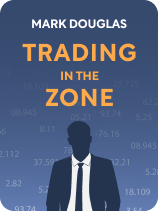

This article is an excerpt from the Shortform book guide to "Trading in the Zone" by Mark Douglas. Shortform has the world's best summaries and analyses of books you should be reading.
Like this article? Sign up for a free trial here .
Are you looking for Trading in the Zone quotes by Mark Douglas? What are some of the most noteworthy passages worth revisiting?
In his book Trading in the Zone, Mark Douglas argues that winning in trading is a matter of your mindset. If you have a fear-based mindset—that is, you focus on avoiding risk—you’ll never achieve success in trading. If you are serious about becoming a profitable trader, you must overcome the fear-based mindset and adopt the winning mindset, focusing on making gains.
Below is a selection of quotes with explanations.
Trading in the Zone: Master the Market with Confidence, Discipline, and a Winning Attitude
In his book Trading in the Zone, Mark Douglas says one factor distinguishes successful traders: a winning mindset. To achieve consistent trading success, Douglas says, we need to train ourselves to think differently, and he shows us how.
The following Trading in the Zone quotes highlight some of the key ideas:
“Most traders have absolutely no concept of what it means to be a risk-taker in the way a successful trader thinks about risk. The best traders not only take the risk, they have also learned to accept and embrace that risk. There is a huge psychological gap between assuming you are a risk-taker because you put on trades and fully accepting the risks inherent in each trade. When you fully accept the risks, it will have profound implications on your bottom-line performance.”
According to Douglas, embracing risk means accepting the possible outcomes of your trades without fear or regret—even negative outcomes. 95% of trading errors stem from our fears about losing money, being wrong, or selling investments prematurely and therefore missing out on maximum profits. So, to achieve consistent success, you need to be mostly free of fear and related emotions like anger, bitterness, and frustration.
“When you operate from the assumption that more or better analysis will create consistency, you will be driven to gather as many market variables as possible into your arsenal of trading tools. But what happens then? You are still disappointed and betrayed by the markets, time and again, because of something you didn’t see or give enough consideration to. It will feel like you can’t trust the markets; but the reality is, you can’t trust yourself.”
The financial market gives us ample opportunity to generate money. Yet, as Douglas explains, most of us struggle to make the gains we want. The crux of the problem is that traders rely solely on market analysis to make their decisions, failing to account for probability. While market analysis is useful for predicting which trades are likely to be profitable, but if you rely on them without a solid understanding of probabilities, you may become disillusioned when your predictions don’t come through.
“When you learn the trading skill of risk acceptance, the market will not be able to generate information that you define or interpret as painful. If the information the market generates doesn’t have the potential to cause you emotional pain, there’s nothing to avoid. It is just information, telling you what the possibilities are. This is called an objective perspective—one that is not skewed or distorted by what you are afraid is going to happen or not happen.”
Douglas acknowledges that overcoming fear can be challenging. After all, the stakes in trading are often very high. Being wrong about a trade and losing money can cause emotional pain and financial ruin. But, Douglas asserts, we need to recognize that our fears are irrational and stem largely from misguided goals that cause us to see the market as a threat. These misguided goals include fulfilling an addiction to intermittent variable rewards, impressing people in our social network, being a savior for our family, and getting a blissful high from winning.
According to Douglas, if we’re motivated by these goals—even just a little—we’ll interpret any market information that indicates we’re wrong as painful. Why? Because by tying our happiness, fulfillment, status, and identity to positive market outcomes, we experience any indication that our goals won’t be fulfilled as a personal threat.
When we perceive the market as a threat, we’re driven by fear to do everything we can to prevent pain (by avoiding risk and losses). We’ll—consciously or unconsciously—second guess our analyses, miss prime buying moments, hesitate to take profits when we should, hold onto losing stocks way too long, and distort or ignore information that goes against our predictions. Meanwhile, Douglas explains, opportunities to cut our losses or make money pass us by. Thus, efforts to avoid risk and pain virtually guarantee failure. Although we might achieve an occasional win, we won’t be consistent winners.

———End of Preview———
Like what you just read? Read the rest of the world's best book summary and analysis of Mark Douglas's "Trading in the Zone" at Shortform .
Here's what you'll find in our full Trading in the Zone summary :
- The role mindset plays in stock trading
- The critical importance of embracing risk
- How to become a confident, consistent winner






